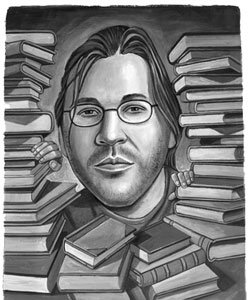From the Magazine
The Written Image: My Ideal Bookshelf

In this issue we offer a look at My Ideal Bookshelf, a collaboration between artist Jane Mount and editor Thessaly La Force, to be released by Little, Brown in November.
Goodbye to Algonquin's Oak Room, E. B. White Answers the ASPCA, and More
Melville House wonders when publishers will speak out about Amazon; New York City's Algonquin Hotel announced that when it reopens this spring after a renovation, the famed Oak Room will be gone; E. B. White answers a charge levied by the ASPCA; and more
Remembering Wislawa Szymborska and Dorothea Tanning, Paul Auster's War of Words, and More
Nobel prize-winning poet Wislawa Szymborska, as well as Surrealist artist and poet Dorothea Tanning, passed away yesterday in their respective countries; novelist Paul Auster has engaged in a war of words with Tayyip Erdogan, the prime minister of Turkey; Open Letters Monthly examines the hidden life of Virginia Woolf's institutionalized half-sister, Laura Makepeace Stephen; and other news.
Obama’s “Bitter” and the Creative Nonfiction Writer: Postcard From the Campaign Trail
The origin and form of Mayhill Fowler’s Huffington Post report on Barack Obama’s use of the word “bitter” suggest her work is neither blogging nor journalism, but creative nonfiction. That its effect was out of proportion with its intention begs the question: What can the creative nonfiction writer expect in the Information Age?
In Search of David Foster Wallace

Whether it’s a thousand-page novel, a single-paragraph story, or a footnoted essay, the elusive author always offers a complicated—and sometimes maddening—reading experience. But is there more to David Foster Wallace than words on a page?
An Interview With Fiction Writer Jonathan Franzen
Less than a year after his third novel, The Corrections, was awarded the National Book Award for fiction, Jonathan Franzen is back with a new collection of nonfiction.
On Essays: Literature’s Most Misunderstood Form
This is not an essay. Though maybe, in a way, it is. Because it's a strange thing about essays—even talking about them, trying to get at what they are, it's hard not to cleave to the spirit of the essay, that inconclusive, most outwardly formless of forms, which spills and seeps into so many other kinds of writing-memoir, feature, commentary, review—and punctuates every assertion with a qualification, a measure of doubt, an alternate possibility.




